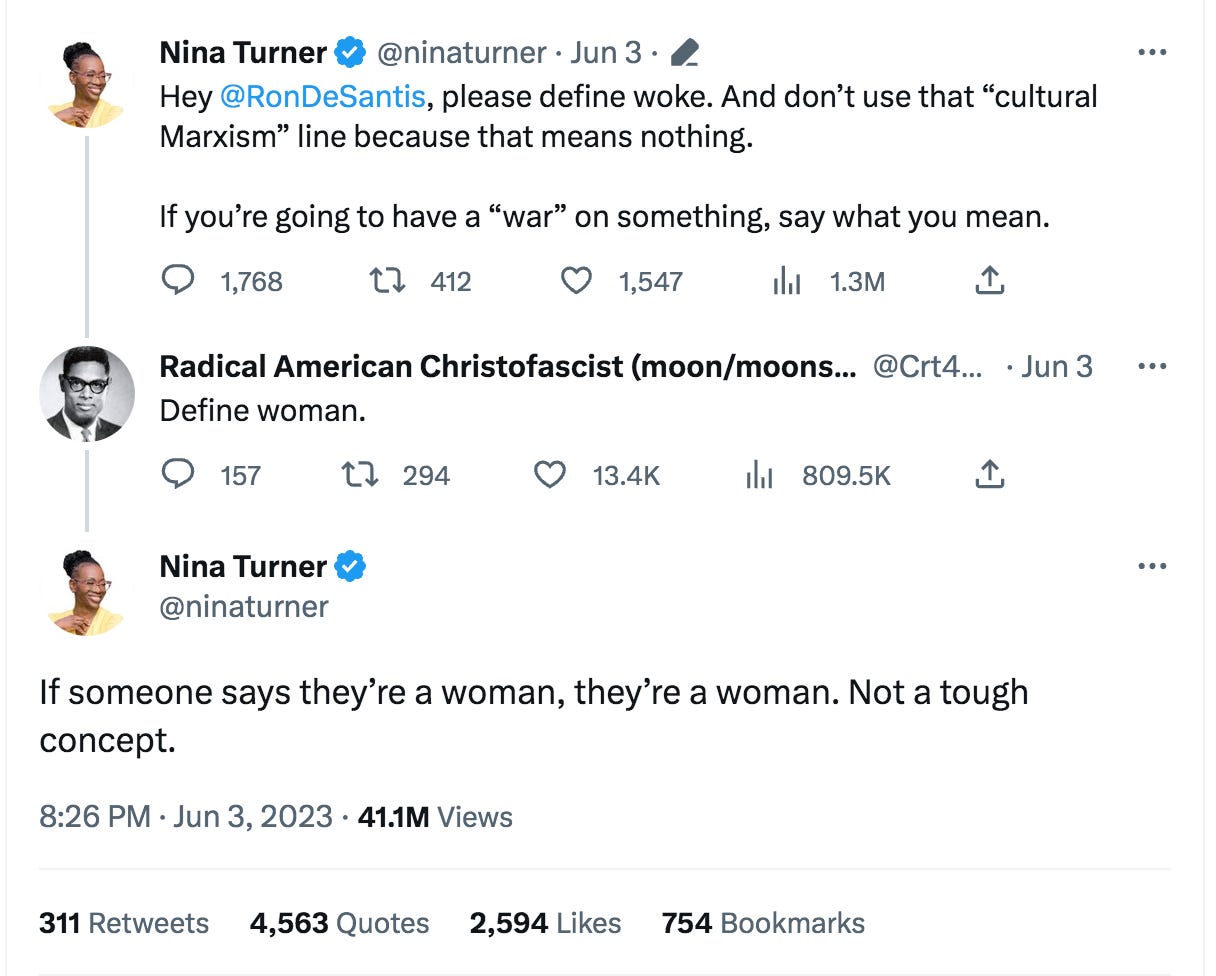E-Pluribus | June 6, 2023
Maybe we are not as polarized as we think; when 'tolerance, inclusion, and equity' are an illusion; and California might shock residents with income-based electricity rates.
A round-up of the latest and best writing and musings on the rise of illiberalism in the public discourse:
Ben Klutsey and Sigal Ben-Porath: Affective Polarization and the Boundaries of Speech
How divided are Americans really? In an ongoing series, Conversations on Liberalism, for Discourse Magazine, Ben Klutsey talks with University of Pennsylvania professor Sigal Ben-Porath about how often perceived or proxy differences are substitutes for actual policy differences, which may not be that substantial.
[Sigal Ben-Porath]: The way in which we are polarized is actually not so much about policy. It’s about our emotions, our feelings and our perceptions of each other and what in political science is now commonly called affective polarization, or sometimes the more punchy title of ideological contempt, meaning that there is a growing feeling among—if you envision the ideological spectrum as running, let’s say, mostly from progressive to conservative—there are more extreme parts of it on both sides, but from progressive to conservative, you can envision most eras, not all, but most eras of American history as having two big tents representing these two large ideologies and generally aligned with the two major parties.
They are not that far from each other, and in various contexts, they even overlap. You can see people who are on one party or ideology but actually support some policies that are favored by the other side, et cetera. Increasingly in terms of our emotions toward each other and toward the opposing ideology, we are finding ourselves moving away from each other and increasingly thinking about the people on the other side of the ideological divide in very negative terms.
There are surveys that show that people think about the out party, the people on the other side of the ideological divide, as unintelligent, as unable to act in good faith, as lazy, as closed-minded. These are all survey results that show us that we really think about each other in very polarized terms. And the concern that this raises is that it really provides zero incentive for us to try and understand each other or work with each other or live in a shared society. Because why would you do that with somebody who you know is closed-minded and lazy and unintelligent? These are really views that historically have not been as high as they are now. They shot up in the last few years, and so this is the component of polarization that I’m mostly worried about.
Read the whole thing.
Monica Harris: When “Protected” Groups Are Silenced, Diversity and Inclusion Are Illusory
Monica Harris is the latest member of a “protected” group to find herself not quite so protected after being found on the “wrong” side of the transgender issue. At her site Lets Get Unplugged, Harris relates her recent experiences with the online publishing platform Medium, which flagged her post as “hateful content” for contradicting the conventional wisdom on transgenderism.
A few weeks ago I published an article on Medium (linked here on my blog) about the impact of transgender inclusion on the rights of women and lesbians. I felt it was a timely and topical subject, and as a gay woman of color I obviously have a vested interest in this issue.
So, you can imagine my shock when, less than 24 hours after the article appeared, Medium’s Trust & Safety team removed it for violating community rules. I was further warned that repeated violations would lead to possible suspension of my account. My crime? Posting “hateful content.” (before continuing, I would encourage you to read the article yourself).
For perspective, I have more than 1,000 followers on Medium and have published nearly 70 articles on this platform. I’m a Harvard educated lawyer and am on the Board of Advisors of the Foundation Against Intolerance and Racism. I’m also a published author and a TEDx speaker. In fact, much of my writing focuses on bringing people together around our shared values and interests. In my entire career, I’ve never been accused of using hate speech or advocating hateful positions. Yet now I was being silenced for expressing my legitimate concerns about an issue that affects me and others in my community.
This incident is laced with many ironies, not the least of which is that I’ve spent much of my life feeling invisible and not having a voice. Growing up black and gay in the 70s and 80s was an alienating and often heartbreaking experience. Thankfully, as America has been forced to reckon with its insidious legacy of racism, sexism, and homophobia, the landscape has changed. Barriers have crumbled and hearts and minds have opened. I now enjoy a thriving legal career in the entertainment industry. I have a white partner and a biracial son. We happily live our alternative lifestyle in a red state that is overwhelmingly white and Christian. The past two decades have empowered me and helped me find my voice.
But now I fear that I’m in danger of losing my voice again. I worry that I and millions of other women are becoming invisible — not at the hands of right-wing extremists, but by people who claim to promote tolerance, inclusion, and equity.
Read it all here.
Shannon Osaka: If You Live in California, Your Power Bill Will Soon Depend on Your Income
The state of California has often acted proudly progressive with policies seen in other parts of the country was overly intrusive. Shannon Osaka writes at the Washington Post that residents of the Left Coast will soon have a chance to put their money where their mouths are, or, more precisely, where their electrical needs are with income-based electric rates quite possibly on the way.
[E]ven as California has hustled to move away from fossil fuels, the effects of a warming planet are transforming the sunny state — and threatening how nearly 40 million people get their power. California is becoming hotter and drier, raising the risk of wildfires sparked by aging, failing power lines. The state’s three largest investor-owned utilities — Pacific Gas & Electric, Southern California Edison, and San Diego Gas & Electric — need to upgrade their infrastructure to shore it up against rising temperatures and fire risk.
All that work means California’s electricity prices have gone sky-high. California’s average retail electricity price is around 20 cents per kilowatt-hour, almost double the national average. And some customers see prices much higher than that: Pacific Gas & Electric offers rates that start at $0.31 per kilowatt-hour and climb to as high as $0.50 per kilowatt-hour depending on the time of day.
[ . . . ]
Those high prices could deter Californians who want to electrify their homes and vehicles to cut carbon emissions. In general, switching out gas heating for an electric heat pump or a gas-powered car for an electric car saves money and helps the planet. But high electricity prices change the calculus. In some cases, people who electrify their homes might end up paying more.
That’s where the new law, which passed last summer as part of a larger energy bill, comes in. First proposed by researchers at the University of California at Berkeley and the nonprofit Next 10, the plan would split utility costs into two buckets: Fixed charges, which everyone has to pay just to be connected to the grid, and variable charges, which depend on how much electricity you use. Proponents say that the creation of fixed charges would cover things like wildfire preparedness and grid updates — and would also lower electricity costs based on usage. In theory, that would make it easier to convince Californians to electrify.
But, in a twist from how many other utilities do it, the fixed charge would be based on how much money the electricity user makes.
“A flat fixed charge is still pretty regressive,” said Meredith Fowlie, a professor of economics at UC Berkeley who helped write the initial proposal. “If you can mimic an income tax, it’s less regressive.”
Read it all.
Around Twitter
Via Wesley Yang, the still photo is surreal enough, but feel free to click through for the video:
The Ace Speedway in North Carolina has got the support of the Institute for Free Speech, Institute for Justice, and the ACLU in its fight against alleged retaliatory measures during the pandemic for speaking out against pandemic shutdowns:
And finally, despite Nina Turner’s assertion to the contrary, her concept about the definition of a woman is indeed a tough one:










